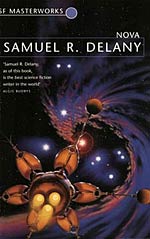
![]() BigEnk
BigEnk
4/24/2025
![]()
In this short little space opera, the colonized universe is separated into three political zones defined by their distance from Earth's sphere of influence. The cost of transportation within the zones and between them is immense, dominated by two elite families who have respective monopolies on spacecraft construction, and the rare fuel that is used to fuel them and all large scale machinery. In a bid for power, the heir to one of these families, Lorq Von Ray, discovers that this fuel (Illyrion) can be found and potentially collected in enormous quantities from the center of active supernovas. In his quest to do so, he assembles a group of ragtag swabbies who operate his spacecraft with neural jacks that are subdermally installed into their bodies. With the blood feud between these families reignited, it's a race against the clock and each other to hold the destiny of the known universe in their hands.
Left in the hands of a lesser writer I could see the conventional premise being downright boring, but thankfully Delany is able to do a lot which what is at its heart a pulp adventure flick. Delany's modernist prose style is married with a mythical, theatrical tone that gives the novel both some chewy density as well as a classical flare that I wasn't necessarily expecting but most of the time found myself enjoying. He also created a really memorable cast of characters outside of the captain himself. There's the Romani kid from Earth with a gravelly voice who play an instrument called a Syrnx, a representation of Pan's Flute that evokes the sounds, sights, and smells of ancient Earth that entertains the crew and connects them to their shared history. There's the wandering academic searching for legitimacy to write a novel of his own, a now archaic way of telling a story. There's the tarot-reading ace pilot and her creature keeping partner, and the twins from the outer colonies who crave an inhaled hallucinogenic known as Bliss. The members of the crew are downright interesting and believable, complete with their own flaws, ticks, and traits.
Delany takes time to explicitly use some of the technology and political landscape he invents to comment on real-world affairs. The subdermal studs or jacks that the working class have allow them to be much more connected tangibly to their work, creates an ease of employment no matter the location, and prevents them from being disenfranchised by changes in technology or market force. Despite a perceived cultural black hole that is commented on throughout the novel, workers in Nova are more connected to the means of production than they were at any other time in history. Here, Delany has created a technology that doesn't strip the workers of their labor rights, but actually empowers them from a Marxist perspective. Delany also uses the difference between the crew and their billionaire captain to explicitly discuss race and class, both of which play a tangible role in people's lives even in the future.
Now, none of this is to say that Nova is without its flaws. There are certainly sections of the novel that are slow in pace and style, hardly the high action that was promised on the back cover, and plenty of cultural references that date it back to the 1960's, the Mamas and the Papas reference in particular. While I loved most of the characterization work, I would've liked if Von Ray's antagonistic foil, the Red Shift heir, referred to as Prince, weren't quite so monochromatic and unsympathetic. I'm also not sold on the ending of the novel, which is tied up in a literary conceit that felt to me as inorganic and forced in comparison to the rest of the narrative. I had the feeling that Delany is better than this, that he's capable of more, but then again he wrote this when he was 25 so I'm sure that he was still coming into form.
Nova is an overly intellectual and sometimes stymieing work that despite all of its blessing felt directionless in the end. There are so many different promising threads here that Delany starts to weave together, I'm just not sure he was able to finish tying them into a purposeful conclusion. That being said, despite its complexity, it's a very approachable work in comparison to Triton, and if read for the prose and characters first I think you can find a lot here to enjoy. An oddball to be sure.